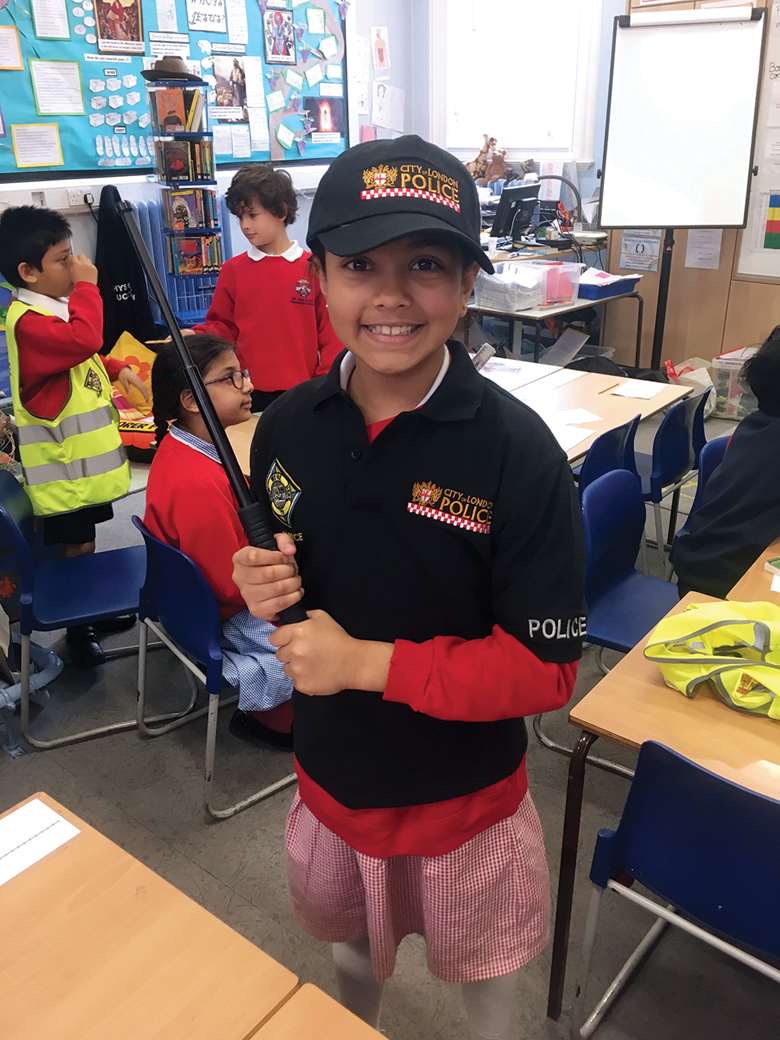Mini police get to grips with cybercrime
Nina Jacobs
Tuesday, February 26, 2019
Police-led scheme raises awareness of cybercrime.

- Programme targets primary school-age children in London.
- Scheme likely to be expanded following successful pilot.
ACTION
A "Mini Police" scheme run by City of London Police has helped teach primary school children about the dangers of cybercrime.
The force's economic crime directorate together with the community policing team ran the three-week programme at Sir John Cass's Foundation Primary School last June.
Officers delivered the training to a group of eight- to 10-year-olds about how to protect themselves from online fraud and how to share this knowledge with friends and family.
The pupils were given police-branded uniforms to wear during the sessions during a trip to Liverpool Street station where they handed out cybercrime prevention leaflets to members of the public. For the final session of the scheme, the children visited the City of London Police Museum to learn about the history of the force.
Detective constable Sarah Jones, force standards manager for the City of London Police's National Co-ordinators Office, who together with colleague Wajeeha Sharif was responsible for developing the project, says pupils learned about different topics over the five sessions.
"We did an introduction session with the police commander, followed by a core lesson about fraud and keeping yourself safe online.
"Then we did an experience lesson where we took the messages the pupils had learned and they got to hand out leaflets to the public. It was a real success and they enjoyed wearing their uniform with mini police hats and hi-vis jackets," she says.
The pilot was developed in partnership with the school after a survey found pupils had little understanding of cybercrime.
"It was quite basic and while the children were aware about cyberbullying there was a huge gap when it came to online fraud," says Jones.
Sharif says that while there are programmes that look at cyber security and online safety, theirs is the first of its kind to "look at tools that children can use to protect themselves".
Jones explains the age range for the pilot - Years 4 and 5 - was chosen specifically to target a younger audience.
"With secondary schools, the technology is intrinsic in their education but in primary school they are also using devices. When we asked the children who had phones, tablets, laptops it was pretty much the whole class," she says.
"We didn't want to scare them, so it had to be handled very carefully - but the fact they use these devices and don't understand the dangers needs to tackled."
The content of the sessions comprised "really simple messages" asking the children to think about their own interpretation of the internet and cybercrime.
Tasks included looking at fake emails to identify false information and highlight suspicious activity by online fraudsters.
Jones says the children took part in a reverse version of "Tell Two" - a key message asking them to share their concerns with at least two friends or family members.
"I told two of the children my password and then they told two of their classmates to show everyone how quickly it would spread. Within 37 seconds everyone in the class knew what it was," she says.
Reinforcing key messages such as keeping passwords safe and protecting data online formed the framework for the pilot sessions.
"Young people are obviously more susceptible to becoming victims now because they use technology at a much younger age," explains Jones.
"As the national lead force [for fraud] it was important to reach out to help stop people becoming victims even if it's something that might not happen to them for another five or 10 years."
Funding for the pilot has been limited and relied on officers to volunteer their own time to put together the sessions and deliver them. Engaging the National Volunteer Police Cadets to help teach the sessions could ensure the scheme is more widely adopted, adds Jones.
IMPACT
Since the pilot, a primary school in Kent has held "mini police" training, although sessions were delivered in class time rather than after school. Pupil feedback from that showed a big increase in their awareness of online fraud.
At the start of the sessions, 42 per cent said they knew what fraud was rising to 87 per cent by the end of the programme.
When asked if they thought fraud was a crime, 54 per cent said it was but this figure rose to 90 per cent after taking part in the sessions.
"We saw a huge uplift in their understanding and parents said that the children were talking to them about it too, which reinforced our other message about telling two people," says Jones.




